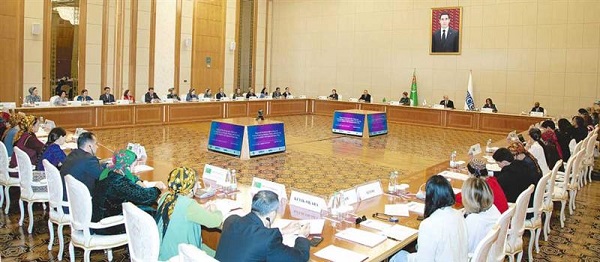Ashgabat hosts a two-day Regional Seminar on the Women, Peace and Security (WPS) agenda and the National Action Plan on UN Security Council Resolution 1325. Organized by the OSCE, the event brought together representatives from various Turkmen ministries and international experts on Resolution 1325, with a focus on integrating gender perspectives into the security sector, the Neutral Turkmenistan newspaper reports.
Turkmenistan’s participation in such a NAP dialogue within the framework of the WPS agenda is a logical continuation of efforts to align national priorities with international standards, maintaining a neutral position and contributing to peace-building through an inclusive and gender-based approach.
While the WPS agenda is often seen as primarily relevant for conflict-affected nations, the core principles of UNSC Resolution 1325 are crucial for fostering inclusive and sustainable peace-building efforts, even in peaceful and neutral countries.
In her welcoming remarks, Myakhri Byashimova, Deputy Minister of Foreign Affairs of Turkmenistan, emphasized Turkmenistan’s commitment to gender equality as a vital part of its sustainable development and security policy. “Turkmenistan, which defends the principles of neutrality, peaceful coexistence, and respect for peaceful law, considers the promotion of gender equality as an important component of its policy in the field of sustainable development and security,” she stated. Byashimova stressed that women’s involvement in peace-building and security must be systemic and institutionalized, not merely episodic. She highlighted how the WPS agenda seamlessly integrates with Turkmenistan’s national approach to peace and stability, noting that the country implements Resolution 1325 through its National Action Plan for Gender Equality for 2021-2025. This document, she added, has become a comprehensive platform for legislative, educational, and social empowerment initiatives for women.
Byashimova also stressed the significant role of the Central Asian Women’s Dialogue. Established in 2019 at Turkmenistan’s initiative and with the support of all five Central Asian nations, this dialogue has become an effective regional platform for advancing the WPS agenda. It maintains close collaboration with the UN Regional Center for Preventive Diplomacy for Central Asia and other regional countries, promoting partnership, mutual support, and women’s participation in governance and peace and development decision-making.
Ambassador John MacGregor, head of the OSCE Centre in Ashgabat, highlighted that a key outcome of the two-day event was the exchange of national experiences and OSCE best practices. This exchange aimed to identify optimal strategies for advancing the WPS agenda and adapting national action plans in line with UNSC Resolution 1325’s principles.
MacGregor underscored that sustainable peace is unattainable without the meaningful participation of women alongside men in discussions. This is known from centuries of human experience, he noted, adding that history consistently proves this through both humanity’s failures and successes.
He pointed out that when women are involved in peace processes, the resulting agreements are not only more inclusive but also significantly more durable. Women contribute invaluable perspectives, shaped by their roles in families and communities, and bring crucial issues such as economics, education, healthcare, and justice to the forefront.
The promotion of gender equality and the empowerment of women is one of the main priorities of the OSCE and occupies an important place in the internal and external activities of the Center in Ashgabat, Ambassador MacGregor emphasized.
He said that 25 years after the adoption of UNSC Resolution 1325, it is clear that the meaningful involvement of women in peace-building and decision-making is not just a matter of justice, but an indispensable condition for lasting peace and sustainable development.
The issue of women, peace, and security was first introduced to the Security Council’s agenda in 2000 with the adoption of Resolution 1325. This landmark resolution emphasizes the critical importance of gender equality and the necessity of protecting women’s rights during and after conflicts. Through its gender equality initiatives, the OSCE actively supports participating States in developing and implementing national action plans that help achieve the goals of Resolution 1325. ///nCa, 28 May 2025
